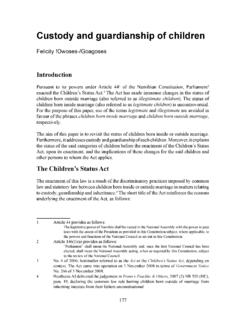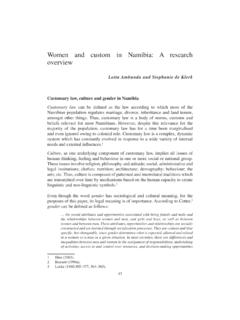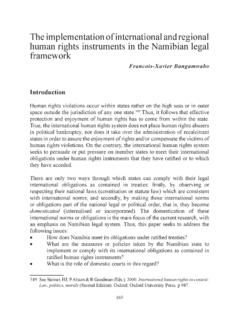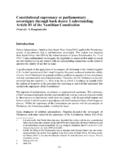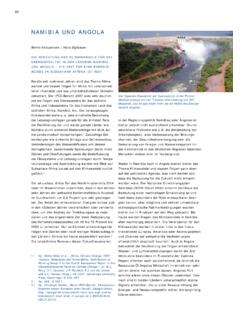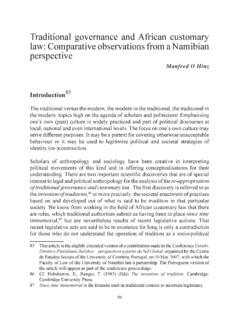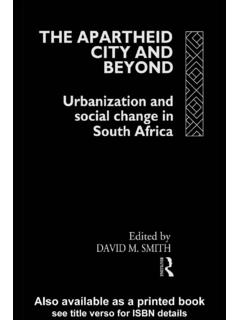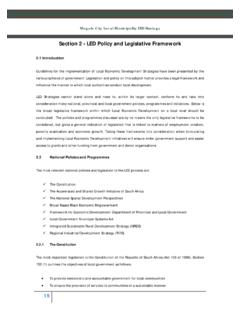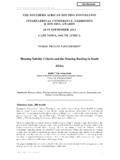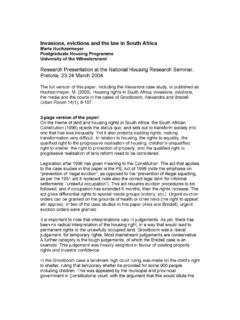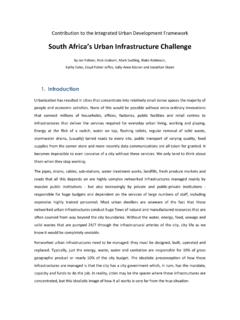Transcription of The Impact of the Cold War and the Fall of the …
1 137 The Impact of the cold War and the Fall of the berlin Wall on southern AfricaThe Impact of the cold War and the Fall of the berlin Wall on southern AfricaJohn DanielSouthern africa s immersion as a region into the international civil war of the twentieth century , as Sue Onslow (2009: 2) has described the cold War, came relatively late in that seven-decade long conflict and lasted only a short period, no more than two decades. Yet the price paid in human and material terms was horrendous, arguably, as I have suggested elsewhere, one of the great crimes of the twentieth century (Daniel in Onslow 2009: 50).
2 The gradual winding down of the cold War in the latter half of the 1980s likewise impacted on events in the south of the region, contributing significantly both to ending a decade of bloodshed as well as to the early 1990s transition to democracy in South africa . The fall of the wall in berlin was unquestionably one of the defining images of the twentieth century but it was not the decisive trigger to change in southern africa . It was, as I will argue, a separate cold war-related development prior to the fall which was the greater catalyst. But first the terrible Impact of the cold War, a catastrophic legacy little recognized by the South African public of the present day.
3 The politician most responsible for the catastrophe of the cold War in southern africa was PW Botha. In 1966, he assumed the post of Minister of Defence in the National Party government. Up to this point, the South African government s primary security concern had been the rising tide of African nationalism and the threat which European decolonisation from africa was seen as posing to continue white-minority hegemony in the south of the continent. PW Botha s vision of regional security was, however, broader. According to a South African Defence Force (SADF) submission to the Truth and Reconciliation Commission (TRC), he conceptualized the threat to South africa within the context of the East-West ideological conflict.
4 In his view, the West was 13820 Years after the Fall of the berlin Wallthreatened by Soviet expansionism and he envisioned South africa as playing a vital role in that conflict as part of the West and as part of a global struggle against the forces of communism (1996a: 4). Central also to Botha s thinking was the notion that the defence line must be kept as far as possible away from South africa (Ibid). Consistent with this view, a number of pre-emptive steps were taken post-1966. These included i) the deployment of police units to both northern Namibia in response to SWAPO s decision to launch an armed struggle and into southern Rhodesia to assist Rhodesian government forces fighting Zimbabwean and ANC guerrillas.
5 According to the SADF, these units were dispatched to fight against men who originally came from South africa and were on their way back to commit terrorism in South africa (1996a:5) a classic expression of pre-emptive interventionist thinking; ii) what the SADF referred to as limited support to Portuguese forces fighting liberation movements in both Angola and Mozambique. This included helicopters and tracking personnel for use in Angola and intelligence and logistical support in Mozambique (1996a: 6). By April 1970, this limited support had developed to the point where a senior SADF intelligence analyst, Brig.
6 Willem Kaas Van Der Waals, was stationed in the South African consulate in Luanda as liaison officer to the Portuguese armed forces in Angola while in Mozambique several high-ranking SADF officers were deployed at the Portuguese regional military headquarters in Nampula, northern Mozambique. One of these was Brigadier Cornelius (Cor) Van Niekerk who in 1979 was appointed to head up the Department of Military Intelligence s (DMI) Directorate of Special Tasks (DST), a covert unit supporting operations by the Mozambican National Resistance (RENAMO) in Mozambique and the Union for the Total Independence of Angola (UNITA) in Angola.
7 By the early 1970s, therefore, there was an extensive co-operative network involving the Rhodesian, Portuguese and South African governments and their security forces committed to preventing the forces of southern African Black Nationalism advancing further south than Zambia and Tanzania. As these relations deepened, so too did their discourse of anti-Sovietism. According to the apartheid intelligence operative, Craig Williamson, by 1971 the security studies field had become a veritable industry with all of South africa s police and war colleges offering courses in the theory and practice of counter-revolutionary warfare whose 139 The Impact of the cold War and the Fall of the berlin Wall on southern africa central tenet.
8 Was that the Soviet Union was central to our security the coexistence of the Soviet Union and imperialist states was unthinkable. One or other must triumph in the end. And before that end comes, a series of frightful collisions between the Soviet Republic and the bourgeois states will be inevitable (TRC 1997:2). In this paradigm, southern africa was conceptualized as part of the bourgeois world in which the Soviet Union would use a series of revolutionary civil wars ..as a means to advance (in camouflage) the Marxist ideal of world revolution (Ibid).
9 The overthrow by revolutionary military officers of the longstanding Salazar dictatorship in Portugal in April 1974 and their decision immediately to abandon their African wars fundamentally changed the balance of power in the southern African region. In one fell swoop, the eastern and western flanks of apartheid s cordon sanitaire separating white and black africa collapsed. In strategic terms, this meant that now for the first time ANC and SWAPO guerrillas could gain direct access to the economic heartlands of the enemy . Even more ominously for the beleagued regime of Ian Smith in southern Rhodesia, it would now face insurgent incursions along its lengthy eastern border with Mozambique.
10 The events of 1974 also affected the power balance within the National Party. Prime Minister John Vorster s power base had since the early 1960s when he served as Minister of Justice been the police and its allied intelligence agencies. Three years after he assumed the premiership in 1966, Vorster created the Bureau of State Security (BOSS) to co-ordinate the activities of both the security arms of the police and the military intelligence division of the SADF. The establishment of BOSS accentuated the longstanding inter-agency tensions within the security arena and BOSS dominance was particularly resented by Minister of Defence PW Botha.
